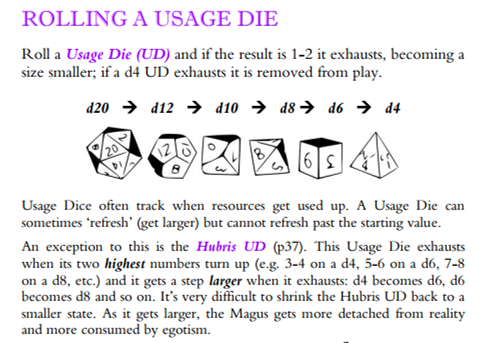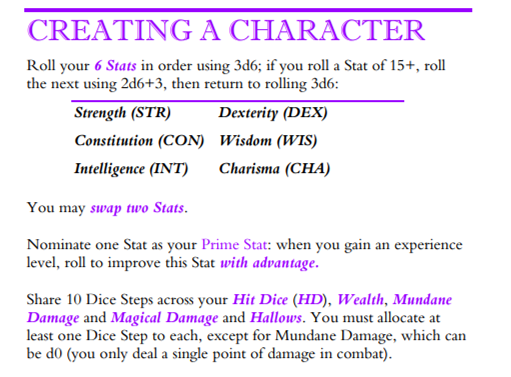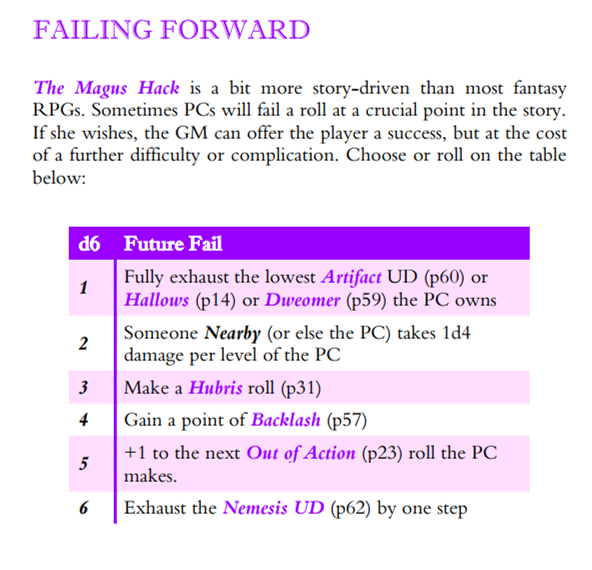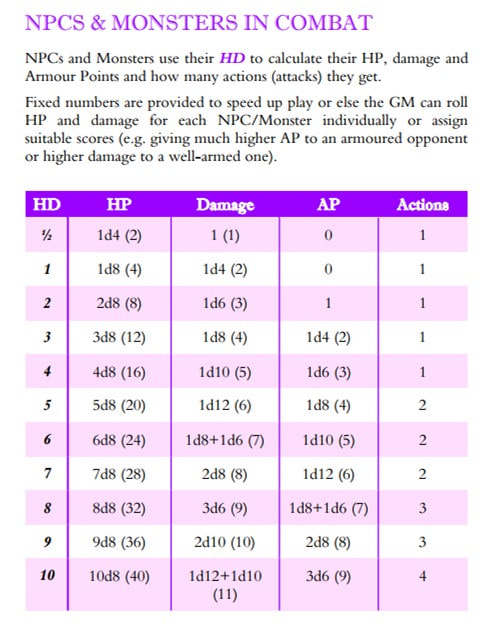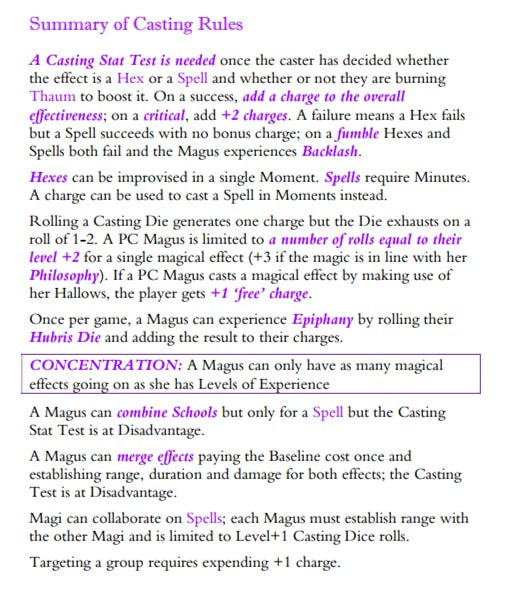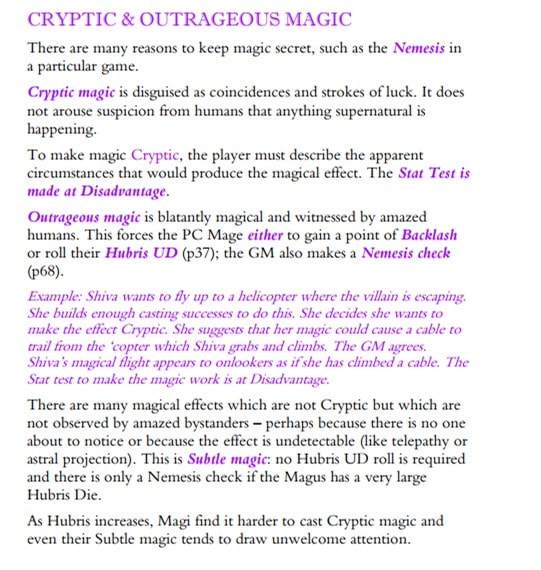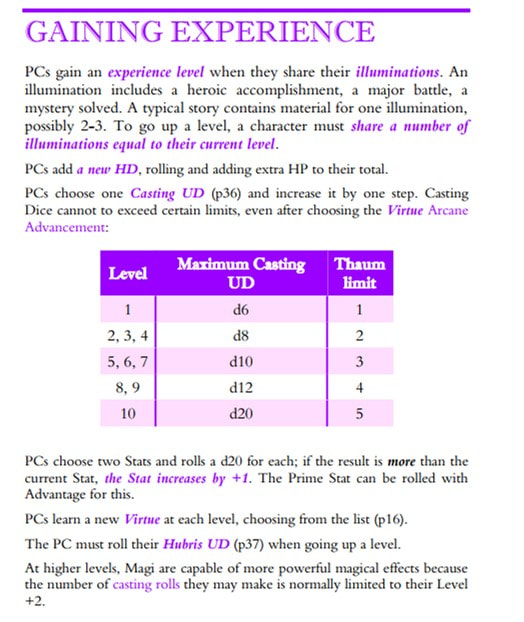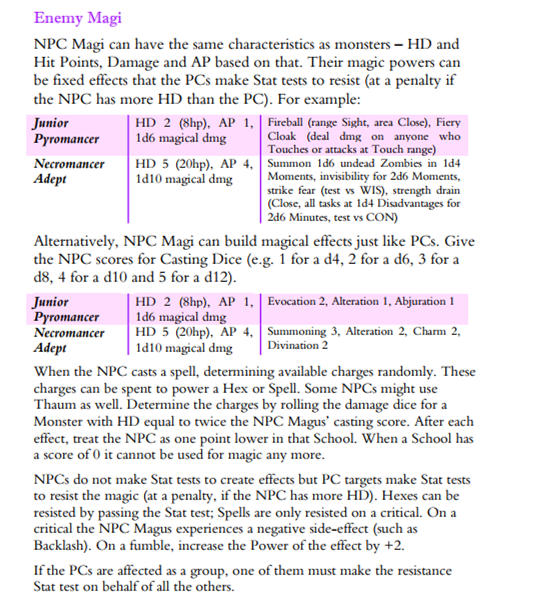If you've bought a lovely physical copy of The Magus Hack it will be frustrating to learn that there are ongoing corrections, tweaks and improvements being made. All I can say is (1) I'm sorry, and (2) the Magus Hack is being refined through playtesting to be the best game it can be.
Here are the corrections so far:
Here are the corrections so far:
The tweak here is that, while most dice 'exhaust' on a 1-2 (as in the original Black Hack RPG), the Hubris Die exhausts when it rolls its largest two numbers. This isn't too fussy, since the Hubris Die is already unique in that it gets larger when it exhausts. This rules change means that triggering Retribution (which might happen when you roll low on your Hubris Die) doesn't go along with increasing your Hubris, but rolling high for Epiphany (when you go all-out for spectacular magic) does risk increasing your Hubris.
Originally, The Magus Hack used the standard distinction between armed and unarmed damage, but it makes more sense for a game of modern sorcery to use Mundane and Magical Damage. The Magical Damage Die is always added to effects that deal damage through magic, which further boosts the dangerousness of magic.
As my campaign gets more narrative-driven, I find myself using the 'failing forward' rule more often. It's not to everyone's taste: if you want PC fortunes to stand or fall by the dice rolls, then ignore this mechanic. But if you do use it to mitigate the impact of bad dice rolls on a nicely-developing plot, I've decided the penalties need beefing up a bit. In the new table, usage dice fully exhaust, lots of damage can be dealt out, Hubris rolls and Backlash can be imposed and the Nemesis Die actually exhausts by one step. The OofA penalty stays the same because this doubles your chance of dying.
The change here is beefing up high-HD enemies a bit further by giving them multiple actions. My thinking is like this: in The Black Hack, high-HD monsters can be made tougher by just having more of them. Going into a dungeon room and meeting a purple worm is alarming, but if the adventurers can take that in their stride, the DM just place two purple worms on the next occasion. The high-HD opponents in The Magus Hack tend to be numinous creatures of myth and fable or else inscrutable arch-magi. You rather diminish their dramatic impact by having more of them. So, in the context of this game, it makes sense to make the high-HD antagonists individually more potent.
In relation to Initiative, I also propose allowing combatants with more actions to go ahead of the initiative order with their first action; if they have 3-4 actions then the third and fourth go at the end of the initiative order.
The casting rules have been stable for some time, but the most recent correction made Hexes a bit more unreliable (they outright fail if you fail on the Stat test, whereas Spells only fail if you fumble).
The thinking here is that a RPG of modern sorcery should feel different from a superhero RPG, so this penalises magical effects that function like 'cool powers' and rewards characters who prepare their magic with ritual and components, adding to the theme.
The thinking here is that a RPG of modern sorcery should feel different from a superhero RPG, so this penalises magical effects that function like 'cool powers' and rewards characters who prepare their magic with ritual and components, adding to the theme.
The change here is to Outrageous Magic, which now offers the player a choice between a point of Backlash or a Hubris UD roll. This helps players manage their consequences and offers more opportunities to gain Backlash beyond the chance of a fumble.
The experience rules have been stable for a long time, but might differ from the first first editions of the rules. The main change has been to allow PCs to increase one of their Schools as well as gaining a Virtue. The other has been to link the limit of how much Thaum you can apply to boosting a magical effect to your level.
There are extra rules for enemy Magi. You can treat them as 'monsters' with fixed powers or allow them to build magical effects the way PCs do. You roll damage dice to work out how many charges they have at their disposal, but you base their 'HD' on their casting score, so a necromancer with Summoning 3 (d8) would roll for charges as if it were a 6 HD monster dealing damage (1d8+1d6 or default to 7 charges, enough to summon something undead for a short time). After each casting, you lower the magic score they used by 1 to approximate the way PC Magi exhaust their casting dice.

